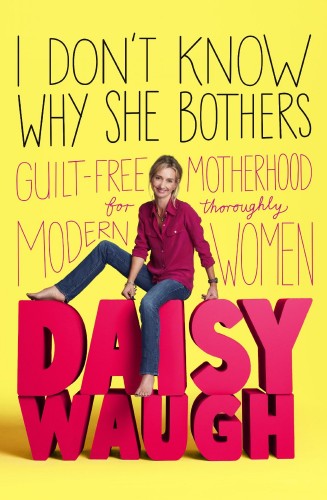
Visiting my lovely local bookshop, Chapter One, during Independent Booksellers week meant that they kindly provided me with free coffee, cake and the opportunity to chat with local poet A.F. Harrold. Of course, all free things have their price and so I duly felt obliged to buy a book. ‘I Don’t know why she bothers’ caught my attention with its promise of ‘guilt-free motherhood’.
What’s it about?
Writer and novelist Daisy Waugh is on a mission to save mothers valuable time and energy while abolishing guilt. It seems that guilt is often an accepted, even expected, by-product of being a parent, so this is a laudable aim. Instead of ‘how does she do it?’ Waugh encourages mothers to ask ‘why does she bother?’ in a book that the blurb hails as ‘part feminist manifesto, part hilarious rant’.
What’s it like?
Waugh opens with a box full of short summaries of conflicting research studies, moves on to a facetious three question quiz and then dives into an anecdote involving ‘clever, serious men’ who (she assumes) have never spent much time looking after their own children and yet are happily criticising young, single mothers. Quickly moving on, Waugh reflects upon the state of modern parenting, the birth of her third child, the reasons people have children, martyr mummies, me time… Flitting about like a grasshopper, she touches upon all these subjects briefly, stating her views decisively and moving on without ever troubling herself to defend her views.
She is inconsistent, stating that mums at the school gate are not scary or troublesome, then writes several pages on how horrible they are. Similarly she sees men as an enemy ‘rubbing their hands together in glee’ over women complaining about other women…then complains about other women.
This reads less like a feminist manifesto and more like a slightly drunken pub conversation between best mates.
These inconsistencies are one reason why this doesn’t feel like a serious book. Liberally peppered with swearing, emoticons, capitalised words, casual insults and an astonishing number of dashes and ellipses, this reads less like a feminist manifesto and more like a slightly drunken pub conversation between best mates. The constant use of subheadings suggests structure but really this is one long set of digressions on the theme of motherhood. Whether or not this relaxed, chatty style appeals will depend upon the reader and their sensitivities. Personally, I longed for a more rigorous editor who might abolish some of the f words and correct the erroneous colons. As a blog post it wouldn’t bother me but as a book the approach felt too casual.
‘It’s easily done. I have done it often.’
Waugh’s opinions become law here. She criticises Michelle Obama for ‘pretending’ that the she doesn’t hire child-care, opining that the ‘First Grandma’ won’t be the one packing the children’s bags or sewing labels into their clothes. Possibly not. But unless she has a hotline to the White House her conviction seems flawed.
This is characteristic of her decisive approach. After dismissively writing off Victorian marriages as ‘nothing more than a badly lit lifetime of mundane sexual abuse – or sex endured’, Waugh implicitly condones infidelity, noting that, obviously, parents won’t fancy each other when they spend their days having conversations about baby poo and their nights cleaning it up. I agree that sex might not be high up the priority list when you’ve just helped your partner clean baby sick out of their hair, but that doesn’t mean couples can’t ever find each other attractive again.
Natural birth is a ridiculous con forced on women by an NHS trying to save money.
Waugh is deliberately provocative. Natural birth is a ridiculous con forced on women by an NHS trying to save money and a public that want mothers to be nothing more than cattle. Dads who attend antenatal classes or, God forbid, want to be present at their child’s birth, are ‘wet’ and she questions how they ‘ever got laid’.
There is some sense under the nonsense. Did you know that men can claim chauffeurs against tax but women can’t claim a nanny or au pair against tax? I agree that baby on board stickers are largely pointless, that regular weigh-ins can contribute to unnecessary parental angst and that referring to someone as ‘mum’ rather than bothering to learn and / or apply their actual name can feel lazy and even insulting. (Rather like when male senior management insist on referring to all female teachers as ‘miss’, it makes you wonder if the person speaking has any idea who you are.)
Final thoughts
Unfortunately, the words baby and bath water come to mind and in her desire to free mothers from the shackles of guilt and undue effort, Waugh replaces one set of expectations with another. Breastfeeding is lazy and the equivalent of doing nothing while you smoke a cigarette; why wouldn’t you bottle feed? Stay-at-home mothers are martyrs with nothing of interest to say to anyone, especially their husband; why wouldn’t you go back to work?
Waugh may simply dismiss me as a ‘mumgelical’ or ‘orgasimum’ but, having made choices she would deem daft, I found her book astonishingly rude at times, and belligerant in its refusal to credit current thinking with any merit. Readers who have made different choices to me may find her tone refreshing and reassuring in its conviction. This is quite an engaging rant if you aren’t the one under attack and could be an enjoyable read.